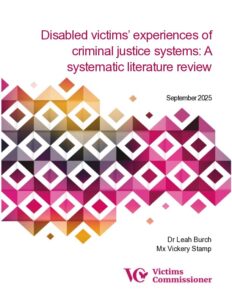Disabled victims’ experiences of criminal justice systems: A systematic literature review
An independent review, commissioned by the Victims’ Commissioner and undertaken by a leading academic, highlights the ways in which criminal justice systems fall short in supporting Disabled victims - and sets out practical reforms.
This report follows the Victims’ Commissioner’s landmark 2023 Victim Survey, which showed a very concerning trend emerging for disabled victims. Too many disabled victims were dissatisfied with the police response to the crime and too few had confidence they could receive justice by reporting a crime.
These findings prompted the Commissioner to further explore disabled victims’ experiences of the criminal justice system. She commissioned Dr Leah Burch to conduct a systematic literature review, collating the literature on disabled victims’ experiences of the criminal justice system.
The review explored existing research into the barriers disabled victims’ face when accessing or attempting to access criminal justice systems in the UK and beyond. The review identified a lack of knowledge among criminal justice professionals about working with and supporting disabled victims and failures to make adjustments for disabled victims.
The review also makes recommendations aimed at improving disabled victims’ experiences of the criminal justice system, two of which the Victims’ Commissioner highlights and will write to relevant agencies about.
Commenting on the review and its findings, the Victims’ Commissioner for England and Wales, Baroness Newlove, said:
“This review validates the experiences shared with me in my victim survey and reveals an uncomfortable truth: too often, Disabled victims are confronted by impenetrable systems, inflexible procedures, and dismissive attitudes that block their path to justice.
From the struggle to secure an interpreter for an interview, to the challenge of
navigating an inaccessible courtroom, these obstacles often leave them feeling
doubted, disbelieved, and dismissed.
For too many Disabled victims, the justice system itself is the biggest obstacle to
securing justice. It shouldn’t be this way – and it doesn’t have to be. I urge justice leaders to carefully consider this report’s findings and ensure every stage of the justice process is truly open to all.”
Dr Leah Burch, the lead author of the review, said:
“Disabled people are both more likely to experience crime and have disproportionately negative experiences of criminal justice systems compared to non-disabled people.
This review explores international research on Disabled people’s experiences of
criminal justice systems, outlining some of the key barriers and proposing a series of recommendations to address these. It is vital to better understand the challenges experienced by Disabled victims of crime in order to create criminal justice systems that are more accessible and effective for all.”
Fazilet Hadi, Head of Policy at Disability Rights UK, a leading disability charity, said:
“Disabled people face discrimination, barriers and lack of support in all aspects of our lives. The challenges we face with the Criminal Justice System are not sufficiently discussed; despite the damaging consequences they have on our lives. This report puts a spotlight on the profound injustices that exist and acts as a call to action.”
Angie Airlie, CEO at Stay Safe East, a leading charity supporting Disabled victims
and survivors, said:
“Justice often seems an unattainable concept for us as Disabled people, given the
barriers that we experience within the criminal justice system. Reasonable adjustments are not being put in place, communications needs are not being met, and victims are confronted by incomprehensible processes, which seem to drag on interminably.
Our hope at Stay Safe East is that Dr Burch’s research kickstarts a systems change that ensures that consideration of the needs of Disabled victims is embedded at all stages of the CJS. This needs to start with awareness training for all professionals involved. Justice should be a human right and not a luxury.”
- Read the news story, highlighting key findings and suggested reforms.
- Download an ‘Easy Read’ version of the review.
- Read the findings from Baroness Newlove’s 2023 Victim Survey.

